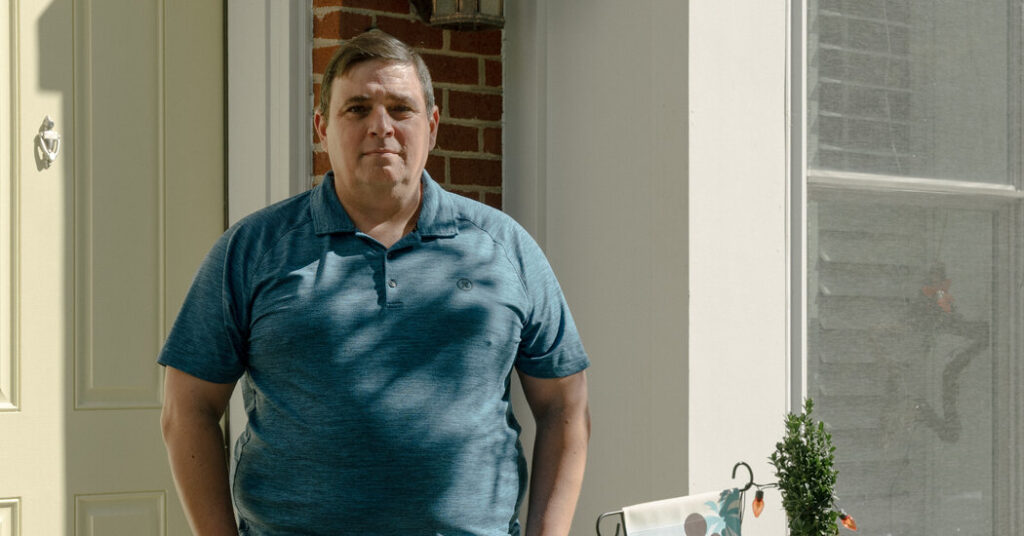The trouble began when the Potomac Yard Homeowners Association reminded Frank Capone in mid-January 2021 to take down his Christmas lights.
Most homeowners would have rolled their eyes and complied. Mr. Capone studied case law, called a lawyer, requested a hearing, ran for the HOA board and kept the lights glowing for years.
Potomac Yard is in Alexandria, Va., an affluent Washington suburb that is home to lawyers, federal workers, government contractors and politicians, including more than 100 members of Congress. Alexandria voted 77 percent for Kamala Harris in the 2024 presidential election, and so did Potomac Yard. Mr. Capone voted for President Trump twice.
Those politics, along with strong personalities and an exacting HOA that bans everything from brass front doorknobs to window boxes, have driven nearly five years of war between Mr. Capone and his outraged board. The battle stands out for its excess. Mr. Capone has spent $40,000 suing the HOA over his right to plant a Mickey Mouse flag in his front flower pot and revoke the street parking privileges of 22 neighbors. Seeking to oust him from leadership, his association started a multimedia campaign, including a video of his Zoom meeting outbursts that drew eyeballs from several states.
The case is another example of how the nation’s partisan divide has reached the hyperlocal level. Nearly one-quarter of Americans belong to an HOA, whose dominion over private property draws ever more complaints. In Florida, where nearly half of residents live in HOA communities, a Republican state legislator, Representative Juan Carlos Porras, is “seriously considering” legislation banning the associations entirely.
“We should not have authoritarian boards dictate your day to day life with no accountability,” he wrote on X.
Mr. Capone, while hardly alone in his efforts, is singular in his approach. He calls it “targeting the devil.”
“He’d be better off living on a rural road where he can just throw garbage out the back door,” said Patrick Doherty, a board member of the homeowners’ association. “But he chose to live in an HOA.”
A court in Virginia is set to decide who is right.
No Birdbaths, Sandboxes or Jungle Gyms
Mr. Capone, 50, sells cybersecurity systems to defense contractors and other corporations. He and his wife, Vanina Colombo, a human resources director who was born in Argentina, have lived in a three-bedroom townhouse in Potomac Yard since 2015, shortly before the birth of their twin daughters, now 9.
Mr. Capone has no legal training, but years of wrangling over property rights have turned him into a kind of townhouse lawyer who likes to quote case law and statutes.
The Potomac Yard HOA charges members $125 a month, which it spends mostly on snow removal and storm water management, insurance, common area maintenance and landscaping. It enforces its rules governing property exteriors through citations and occasional fines.
The rules ban garden sheds, jungle gyms, sandboxes, awnings, clotheslines, birdhouses, birdbaths and feeders. Residents may display an American flag, but no garden flags, banners or political signs. Homes are painted by the builder in one of 21 colors, and homeowners cannot change a house that was originally painted Green Porcelain to Rembrandt Ruby, for example. All exterior doorknobs and locks must be finished in “satin nickel.”
Landscaping, including of individual homes, is done by the HOA. When plants need replacement, residents work with the landscaping committee, which keeps a list of approved native species.
To broadcast his belief in “free use and inalienability of property,” Mr. Capone has festooned his house with HOA-prohibited décor. He planted cartoon garden flags in the hedges, installed as many as four bird feeders and wrote Trump campaign messages on his garage and alley pavement in chalk last year. He displayed a Trump banner in front.
‘Eye for an Eye, Baby’
In 2021, Mr. Capone won the HOA board seat previously occupied by Rickey E. Dana, a communications professional. Ms. Dana had originally joined the association’s leadership to push for change, after its rules prohibited her from changing the color of her front door from “rotten salmon” to blue. But Mr. Capone had already irritated several of his neighbors, sometimes by photographing their homes and reporting what he viewed as violations to the HOA rules. He also posted various complaints on Nextdoor, the neighborhood-based social media platform.
Once on the board, Mr. Capone began digging through financial records and governing documents, searching for activity that went beyond the association’s legal powers. He homed in on street parking and landscaping policy.
Alexandria required that Potomac Yard’s developer provide homeowners with parking, but two dozen of its 250 townhouses were built without garages. The HOA reserved parking spaces for them on an adjacent private road, which it owns, but Mr. Capone argued that it was illegal to give them exclusive right to those spaces since the road belonged to all residents, whose assessments paid to maintain it.
Neighbors say that to prove his point, Mr. Capone ignores stop signs on the road or drives its length while blowing his car horn. In a public meeting, he said that because the road was private, stop signs were “nothing more than a mere suggestion.”
Mr. Capone further believes that the HOA should not maintain the landscaping surrounding individual homes. He accused board members of personally profiting from the parking and landscaping policies.
Board meetings soon devolved into a cacophony of charges, countercharges and shouting. Mr. Capone told board members they were “charging my kids for your customized landscaping” and accused the landscaping chairwoman of self-dealing for having some plants replaced.
As Mr. Capone berated her, “the heartbeat monitor on my Apple Watch went off,” said Mr. Doherty of the HOA board.
Mr. Capone’s accusations rattled the board. It halted its annual compliance inspections and conducted a review of legal documents, overseen by a lawyer who works in HOA law. The association says its legal bills grew to $139,000 in 2023 from $21,000 in 2021, before Mr. Capone joined the board.
The other four board members and several neighbors debated what to do. Removing a board member required approval from a majority of 725 homeowners in a community where most HOA meetings draw fewer than a half-dozen attendees. It would take an enormous campaign to oust Mr. Capone. Ms. Dana, the former board member, recalled discussions of whether that would be legal, ethical or counterproductive.
“But then we were like, ‘Eye for an eye, baby,’” she said. “‘Bring it.’”
In October 2023, Ms. Dana started a petition on Change.org that sought to remove Mr. Capone “for disruptive behavior and misuse of power” and asserted that he had bombarded the board and related targets with 9,000 pages of emails containing “baseless accusations, insults, plots for personal vendetta, etc.”
Two neighbors created a website, RemoveFrankCapone.org, with a 35-minute sizzle reel of Mr. Capone erupting during meetings.
HOA members who worked nearby at the Pentagon rose before dawn to deliver fliers to everyone in the “core area of operation,” as they called the neighborhood.
Mr. Capone disputes the number of emails but said he did have to send a lot because “the association was supposed to have a message board and never had it.”
As news of the battle spread among HOA members in the region, Mr. Capone complained to Change.org about the petition, and the site redacted his name. He sued Ms. Dana for defamation, seeking $9,800 in a small claims court in Virginia. In court, she produced a spreadsheet of his thousands of emails and transcripts from the board meetings. He lost.
He reported the RemoveFrankCapone.org website to the police. Its creators moved it to a private server.
In December 2023, Potomac Yard residents voted 405 to 4 to oust Mr. Capone from the board.
“They attacked me because I’m a whistle-blower,” he said, “and I guess I got their attention.”
A Lawsuit, Among Many
After Mr. Capone’s ouster, the board began fining him as much as $50 a day for each violation outside his home. The penalties eventually reached $5,000.
In March, Mr. Capone and Ms. Colombo sued the Potomac Yard Homeowners Association in Alexandria Circuit Court. The suit challenged the reserved parking spaces and claimed that design provisions in the HOA governing documents did not specifically prohibit garden flags and bird feeders, among other décor.
Despite the lawsuit, Mr. Capone has run in every board election since his ouster, saying he represents a “silent majority” of homeowners who agree with him. He has lost each time.
Asked why he moved to Potomac Yard in the first place, he had a ready answer. “Mainly, location,” he said. Also it was less expensive than downtown Alexandria.
This year, he withdrew his candidacy, saying his lawsuit could pose a conflict. He got nine votes anyway; the winner received 238.
During a visit to the couple’s home, Ms. Colombo said her husband’s fight “is what it is.”
She does not love the clutter outside their home, and with the $450 an hour they are paying a lawyer they could be “traveling the world with the kids,” she said.
Last month, Mr. Capone notched an incremental victory.
On Oct. 8, an Alexandria Circuit Court judge denied the Potomac Yard HOA’s motion to dismiss Mr. Capone’s case. He set a trial for early April.
Mr. Capone was ebullient.
“Once we win,” he said, “we’re probably going to go after them again, for other things.”
Elizabeth Williamson is a feature writer for The Times, based in Washington. She has been a journalist for three decades, on three continents.
The post Don’t Tread on Frank: How One Man’s Yard Became a Battlefield appeared first on New York Times.




